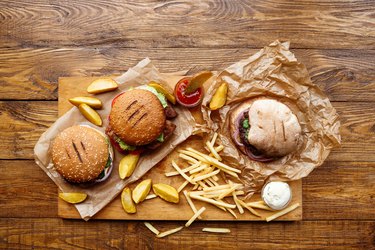
Liposuction seems like an easy fix for stubborn fat. In fact, it's a major surgery that typically requires general anesthesia, and liposuction recovery can be lengthy and painful. That doesn't mean you shouldn't do it, however, as it can have beneficial effects on your, health, self-esteem and promote other physiological and psychological changes that may help you keep the weight off, according to a December 2015 study in the Journal of Diabetes and Obesity. However, the most important part of maintaining your liposuction results is to eat a healthy diet and avoid sugary, processed, refined and fatty foods.
Tip
Your diet after liposuction should not include refined and processed foods and foods high in sugar or fat.
Video of the Day
Liposuction Recovery Diet
There isn't a specific diet that is recommended immediately following a liposuction procedure. What you should eat will depend on the scope of your procedure and whether you were under general or local anesthesia. The more involved your procedure was, the more your post-surgery diet will be affected.
Video of the Day
After surgery, you may feel fatigued, nauseous or constipated and have little appetite. This is normal, according to the National Institutes of Health. But it is important to maintain good nutrition, because it can speed up the healing process. NIH suggests trying to eat smaller meals more frequently throughout the day.
It's also important to choose the right foods. LiveWell With Unity Point Health recommends focusing on getting enough of the following nutrients, which all play roles in healing:
- Protein found in eggs, chicken, fish and beans
- Vitamin C from fresh fruits and vegetables
- B12 and iron in foods such as eggs and fish
- Fiber from fruits, vegetables and whole grains
- Probiotics found in yogurt and fermented foods
Some of these foods may not be palatable in the first few days of recovery, and they could stress your digestive system. Following a bland diet during that period may help you get the nutrients you need while allowing your digestive system to rest so your body has more energy to direct towards healing.
Read more: The 7 Principles of Fat Loss
Foods for a bland diet include:
- Well-cooked vegetables without skins or seeds
- Cooked and pureed fruits and vegetables with skins and seeds removed
- Roasted or baked chicken without skin
- Smooth peanut butter
- Smooth hot cereals such as cream of wheat
- Caffeine-free beverages
- low-fat milk and dairy
Avoid spicy and fatty foods, and increase your fiber intake very gradually to avoid bloating and gas.
Foods to Avoid After Liposuction
It's a misconception that liposuction is a permanent solution to excess body fat. For this reason, many people think they can eat whatever they want after the procedure, and the fat won't come back. This couldn't be more wrong. While liposuction has removed fat cells from your body, the ones remaining can still grow in size if you consume more calories than your body burns.
The foods not to eat after liposuction are the same foods that all adults should avoid in a healthy, weight-management diet. These include, but are not limited to:
- Fried foods, including fried chicken, French fries and potato chips
- Candy
- Baked goods, such as cookies, cakes and pastries
- Desserts, including ice cream, pudding and mousse
- Sodas and other sweetened beverages
- Fast food
- Refined grains and refined grain products such as white rice, white pasta, white bread, crackers and pizza crust
- Fatty and processed meats, including sausage, bacon and salami
- Sugary cereals
There are even some "healthy" foods that are hidden sources of fat and sugar. Some of these foods can have just as much sugar and fat as the foods in the list above, such as:
- Flavored yogurt
- Fruit juice
- Whole-grain cereals and granola
- Granola bars
- Pasta sauce
- Barbecue sauce
- Store-bought dressing
Become adept at reading labels to determine which foods you should avoid. According to the University of California San Francisco, there are more than 60 ways sugar can be listed on ingredients labels, including brown rice syrup, high-fructose corn syrup, sucrose, barley malt, dextrose and maltose.
Read more: The 13 Most Creative Weight-Loss Tips Ever
Foods to Enjoy for Life
Your post-liposuction diet may be a 180 turn from your pre-liposuction diet. But if you really want to make your investment pay off, change is necessary. Don't worry — it's not going to be as bad as you think. Making small changes to cut out unhealthy foods and add nutritious ones will acclimate your body to no longer crave those unhealthy foods. Take it one step at a time and you'll notice how your appetite and tastes begin to change.
Increasing your intake of lean protein, fiber and healthy fats will help you feel full and satisfied on fewer calories. Fresh fruits, vegetables and whole grains will give you energy so you can maintain a regular exercise routine — which is also key to keeping the fat away. Keep your health and aesthetic goals in mind and be conscious when you make food choices, so that you can reap the benefits of your slimmer body shape for years to come.
- Journal of Diabetes and Obesity: "Physiological and Psychological Changes Following Liposuction of Large Volumes of Fat in Overweight and Obese Women"
- LiveWell With Unity Point Health: "How to Heal Faster After Surgery: 5 Tips to Speed Up Post-Op Healing"
- Memorial Sloan Kettering Cancer Center: "Bland Diet:
- American Society of Plastic Surgeons: "Best Foods to Eat After Liposuction"
- UCSF: "Hidden in Plain Sight"
- NIH: "NIH Clinical Center Patient Education Materials Post-Op Instructions: Taking Care of Yourself After Surgery"